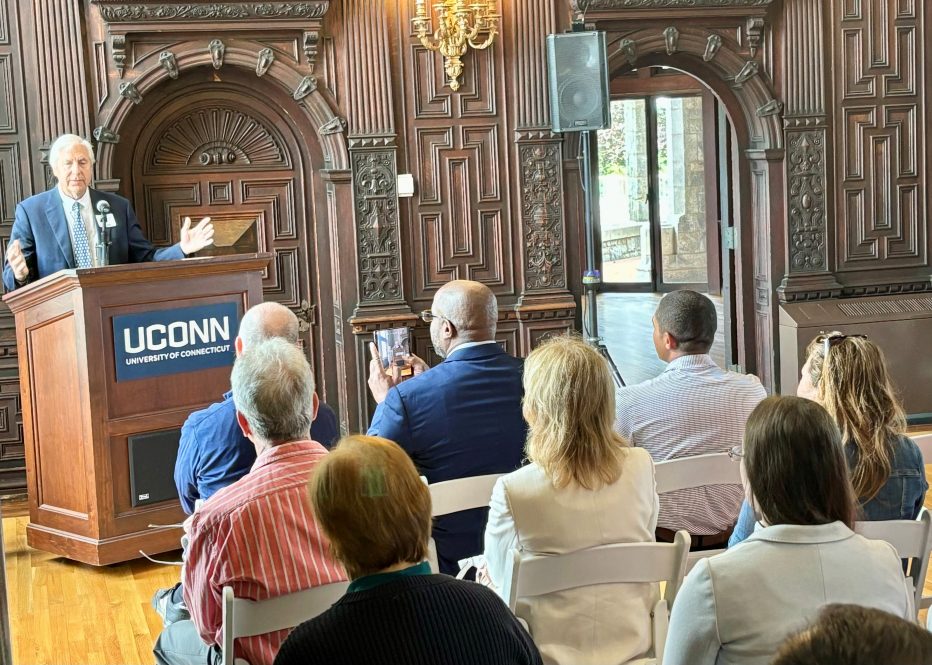For almost six decades, UConn Avery Point has provided students with a world-class education and the academic benefits of a waterfront location, along with the personalized attention and convivial atmosphere of a small college setting.
Now, buoyed by those strengths and guided by its Strategic Plan, the University is eyeing Avery Point for potential enhancements that would build on its successes and promote holistic student success, while maintaining the welcoming atmosphere that makes it such an attractive choice.
UConn administrators, Board of Trustees members, community stakeholders, and dozens of other people gathered Tuesday at Avery Point to celebrate its successes and begin a conversation about the potential of the campus in coming years.
It’s part of a broader initiative under the recently adopted Strategic Plan, which includes a focus on offering signature academic and research programs at regional campuses that build on the unique attributes and strengths of each location.
With about 450 students on its 72-acre campus, UConn Avery Point offers specialized programs in marine sciences and maritime studies that can be completed in four years on site, along with four-year majors in English and General Studies.
Students also have access to more than 110 majors that can be started at Avery Point and completed elsewhere, usually at the Storrs flagship campus. In addition, students have access to a range of academic, recreational, artistic, and community-oriented activities along with faculty and staff who are deeply invested in the success of the campus.
UConn has not determined specifically what enhancements may be considered for Avery Point, but the University has fielded questions for years from the community and families about the possibility of student housing.
The University plans to start exploring the feasibility of student housing as part of the larger discussion on the vision for the potential future of the campus, but does not expect to make any decisions until more information is gathered and assessed.
Although there is no university or state funding available to support building a residence hall, UConn leaders plan in coming weeks to discuss alternative approaches to identify and evaluate options, such as through an external partnership, if they would be feasible.
“We want to work with the community to grow this campus,” UConn Board of Trustees member Tom Ritter told the crowd at Tuesday’s event. “In order to do that, we need to have students in residence here. We need to have more four-year degrees. We need to work with the business community to make sure that what we’re teaching here helps them to get jobs, especially in this region.”
UConn Board of Trustees member Marilda Gandara said when she visited the campus for the first time years ago, she was struck by its beauty and uniqueness – an awe that remains to this day, she said, and which is widely shared in the area.
“This campus is just incredible. It is so different from anything else,” she said Tuesday. “This is also a very important area for economic development as well, and that’s something that UConn brings everywhere it goes.”
UConn officials also have talked for several years with local corporations about the kinds of additional four-year majors that may be possible on campus – particularly engineering programs – and which could prepare students for jobs at those employers.
The Avery Point campus was founded in 1967 and has more than 450 full-time students, including more than two-fifths who are the first generation in their families to enroll in college. Situated on Long Island Sound, it reflects the region’s proud maritime tradition and active leadership in science, technology, engineering, and mathematics (STEM) fields.
UConn’s wide-ranging new Strategic Plan includes a focus on celebrating and expanding the strengths of its seven campuses, which include Avery Point along with Storrs, Hartford, Stamford, Waterbury, UConn Health in Farmington, and the School of Law in Hartford.
“We have seven amazing campuses, and each is a unique resource that contributes to the overall mission of the university,” Anne D’Alleva, UConn’s provost and executive vice president for academic affairs, told the group at Tuesday’s event.
“We have an opportunity to position the Avery Point campus to fulfill its mission of research, education, and community engagement to the fullest extent possible,” she said.
Annemarie Seifert, UConn Avery Point’s campus dean and chief administrative officer, said the wide range of research and academic offerings on campus are among the factors that make it unique, especially in areas of shoreline resiliency, climate and maritime studies, and sustainability-related fields.
“These are just a few reasons why this place is so special,” she said. “There’s a specialness that I feel and see every day on campus. It’s a treat observing students spontaneously engaging faculty and staff at Mort’s Café, turning brief encounters into meaningful sit-down conversations. These interactions undoubtedly contribute to student success.”
In addition to UConn’s status as a Land Grant University, it also is among 34 institutions designated as a Sea Grant University by the National Oceanic and Atmospheric Administration due to its Avery Point campus academic and research activities.
They include marine vessels equipped to be at sea for short- and long-term field studies, a variety of research activities in specialized on-shore facilities and in the waters of Long Island Sound, and community partnerships such as its role in the Connecticut Natural Estuarian Research Reserve and its research with corporate partners to determine the effects of offshore wind farms on marine life.
The Connecticut Institute for Resilience & Climate Adaptation (CIRCA), also located at Avery Point, also has become a critical regional asset to help communities that are vulnerable to the growing impacts of climate change. Those and other assets at Avery Point make it a valuable location worth enhancing, participants said at Tuesday’s event.
“We know some of the things that we need to look at synergistically: the academic offerings here, the economic engagement, the community engagement, and the student experience across all dimensions to make sure that this campus fulfills all of its amazing potential,” D’Alleva said.



